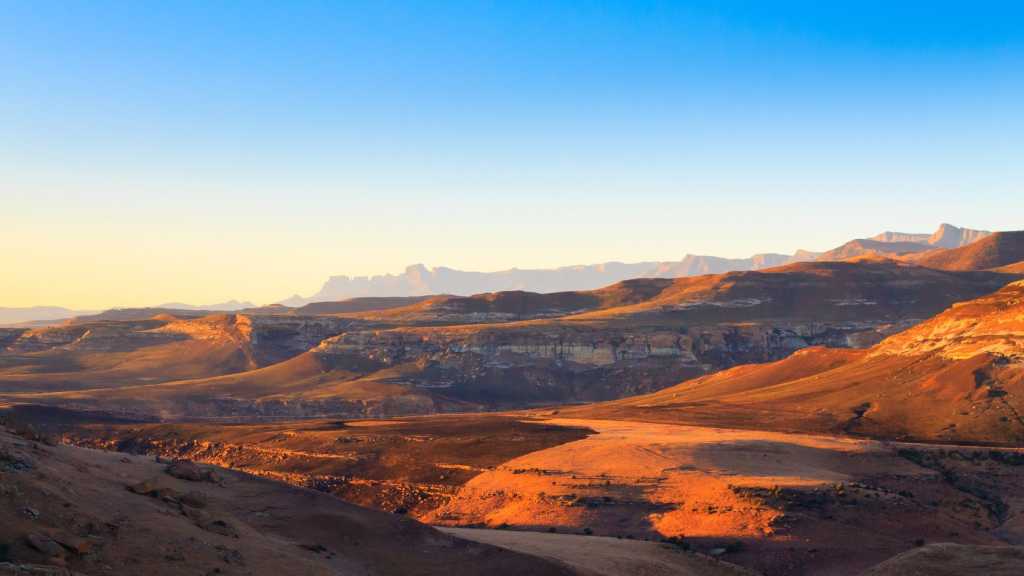Drakensberg (Kwazulu Natal Interior and Free State)
Fantastic wall of basalt that stretches over 250 kms and rises to 3,482 meters, the Drakensberg - or Dragon Mountain in Afrikaans - has also been recognised as a World Heritage Site since 2000. This region stretches from Royal Natal in the North to the city of Kokstad in the South and includes the Escourt and Ladysmith battlefield areas and the South Midlands.
It’s not easy to explore the whole Drakensberg either inside or outside the park so it’s better to settle in an area and explore the surroundings to enjoy its majesty and its views often described as the most emblematic of South Africa.
Advice:
- The Drakensberg is an ideal stopover between Johannesburg and Durban… the Royal Natal National Park, like almost all parks of the Drakensberg offer day hikes and for all levels…
- If you like rock paintings, then do not miss the rock art sites in the Royal Natal. You can organise a guided walk with local guides in SAN Rock Arts.
- The Ezemvelo KZN Wildlife does not recommend to walkers to leave alone, even during the day. Guides are usually available. It is imperative, for any walk, to sign the register before leaving… (rescue register) and to be well informed about the hikes and their duration…
- The small town of Howick, in the Midlands is home to the site where Nelson Mandela was captured in 1962. This place called « Capture site » is now a powerful and moving memorial relative to a critical moment in South African history. The on-site sculpture with Mandela’s face is definitely worth seeing!
South Africa, the 'rainbow' nation.
South Africa is so diverse you feel like you are visiting several countries in one trip!
With grandiose and various landscapes (mountains, « bush », beaches, forests, plains, desert), a pleasant climate in all seasons, an abundant and diversified fauna and flora including the “Big Five”, a population with the most composite ethnic groups, South Africa accumulates important natural wealth. Also note among its assets: quality of the hotel sector, services, road network, means of transport, rich and varied gastronomy, excellent wines, favourable exchange rates, 21 national parks and many private reserves, a multitude of activity throughout the country…
When to go?
South Africa has this peculiarity of presenting a wide variety of climates: Mediterranean, subtropical or temperate depending on the region with a high rate of sunshine everywhere (watch out for sunburn!)
South Africa can be visited all year round with more favourable periods depending on interests:
-
June, July and August (South African winter) for animals and therefore preferably the North of the country.
-
September and October: best times for flowers (Namaqualand) but very good for game drives as well.
-
From November to March (South African summer): best time to enjoy the South and East of the country, beaches of the Cape and the Indian Ocean. The Garden Route is particularly appreciated in February: the weather is nice; the temperature of the water is pleasant.
-
April and May: very pleasant autumn with always nice days in Cape Town and the resumption of the animal season.
Formalities:
The passport must include two blank pages and still be valid for 30 days after the expected date of exit from South Africa.
French nationals are exempted from prior visas. A 90-day residence permit will be issued at the border on entry into South African territory.
For other nationalities, inquire on a case-by-case basis with the competent authorities of their country of origin.
For any minor child: a multilingual extract of birth certificate (or an unabridged birth certificate translated into English - certified translation) is required to enter and leave South Africa (in the case of a child traveling with his 2 parents). Please consult the official sites for more information about all the requested documents according to your case.
Health:
No vaccinations are required for entry into South Africa. However, it is advisable to check the updating of your usual reminders and vaccinations as for any country.
Anti-malarial treatment is recommended (see your doctor).
Currency:
The Rand is the official currency of South Africa (symbol: ZAR). Credit cards are accepted everywhere and distributors are easily available for cash withdrawal. Travellers’ checks in euros are also accepted in banks and some hotels.
